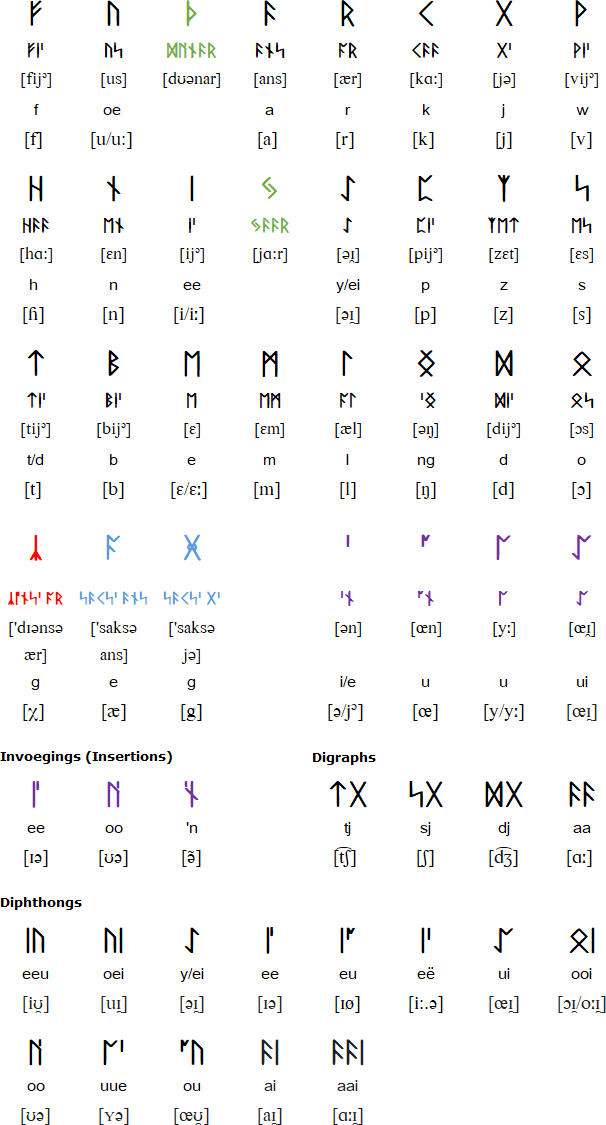Roenskrif is a way to write Afrikaans with the Elder Futhark runic alphabet devised by Luan Bierman. It was created for use in an alternate history world building project depicting South Africa in a world where the Latin alphabet is not widespread.
In this world, the Dutch colonists at the Cape of Good hope brought along with them a highly traditional preservation of the Elder Futhark as used by their Frankish predecessors. This conservative writing system is what eventually develops into Roenskrif.
For much of this alternate history of the Afrikaans language, an unchanged form of the Elder Futhark was used. This writing is now known as Ouskrif (“old writing”). Within it are several quirks and complexities which developed for use with Early Modern Dutch, but are now plaguing modern Afrikaaners and their comparatively phonetically simplistic language. Most notable are non-phonetic digraphs such as oe for [u], co-opting u for [y] , and the use of runes and digraphs which have no phonetic distinction in Afrikaans, such as the retention of ᚦ, though [θ] and [ð] are not present in Afrikaans.
Due to these issues, from approximately 1917, Die Taalkommissie (“The Language Commission”), began to standardise and improve the Runic script, mirroring the same standardisation which occurred in actual history. Conversely to our world however, the Taalkommissie allows both Standard spellings as well as spellings which indicate more dialectal writing for the purpose of cultural preservation.
Nuskrif (“New Writing”) is the subject of this page. In our alternate world’s modern day, Nuskrif is the defacto manner of writing Afrikaans. However, due to the runes’ deeper cultural connection to the Germanic people, many conservative Afrikaaners maintain use of Ouskrif as a competing standard. This has influenced certain standards even in Nuskrif. More details (PDF)

Download an alphabet chart for Roenskrif (Excel)
Download a font for Roenskrif

Alle menslike wesens word vry, met gelyke waardigheid en regte, gebore. Hulle het rede en gewete en behoort in die gees van broederskap teenoor mekaar op te tree.
All human beings are born free and equal in dignity and rights. They are endowed with reason and conscience and should act towards one another in a spirit of brotherhood.
(Article 1 of the Universal Declaration of Human Rights)
Information about Afrikaans | Phrases | Numbers | Family words | Time | Tower of Babel | Afrikaans courses on: Amazon.com and Amazon.co.uk [affilate links]
Constructed scripts for: Ainu | Arabic | Chinese languages | Dutch | English | Hawaiian | Hungarian | Japanese | Korean | Lingala | Malay & Indonesian | Persian | Tagalog / Filipino | Russian | Sanskrit | Spanish | Taino | Turkish | Vietnamese | Welsh | Other natural languages | Colour-based scripts | Tactile scripts | Phonetic/universal scripts | Constructed scripts for constructed languages | Adaptations of existing alphabets | Fictional alphabets | Magical alphabets | A-Z index | How to submit a constructed script
[top]
You can support this site by Buying Me A Coffee, and if you like what you see on this page, you can use the buttons below to share it with people you know.

If you like this site and find it useful, you can support it by making a donation via PayPal or Patreon, or by contributing in other ways. Omniglot is how I make my living.
Note: all links on this site to Amazon.com, Amazon.co.uk
and Amazon.fr
are affiliate links. This means I earn a commission if you click on any of them and buy something. So by clicking on these links you can help to support this site.
[top]